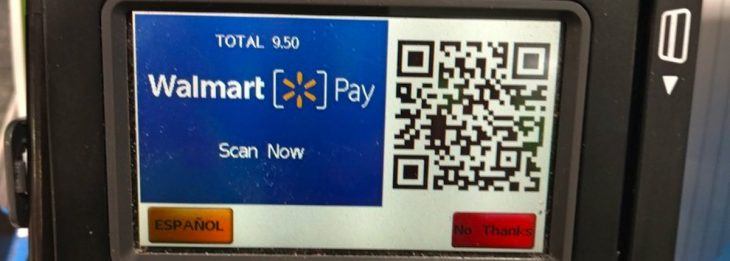Study: One in four U.S. smartphone owners use mobile pay, WalmartPay numbers remain unknown
by July 5, 2016 5:28 pm 440 views

Use of mobile pay among U.S. consumers is growing, particularly at retailers like Starbucks and Walmart U.S. who have adopted their own forms of mobile payment, according to research conducted by Dallas-based Parks Associates.
The report indicated that 25% of smartphone owners in the U.S. use mobile platforms at least once a month. While Apple Pay and Android Pay are accepted by nearly 3 million retailers, the majority of mobile pay users are loyal consumers who use retail-specific payment apps. For instance Starbucks’ mobile pay platform processes 5 million transactions per month, according to the report. While Walmart has not given specific data usage on its Walmart pay platform, that service is being rolled out nationwide at its stores this summer.
“Current vendors of digital wallet solutions are promoting in-store payment as a major value proposition for consumer adoption, but retailers large enough to create their own solutions are currently winning most of the adoption,” said Harry Wang, senior research director at Parks Associates.
He said retailers are still hesitant to embrace other payment apps because of high upgrade costs to point-of-sales terminals and other issues beyond their control when using third party mobile payment systems like Apple Pay or Android Pay.
The report indicated that consumers use payment apps mostly for purchasing food and drink, clothes and tickets for events such as concerts. By supporting payments in the three areas, app developers can reach almost 75% of payment app users in the U.S., and new digital wallet app developers who targeted this opportunity with loyalty-program wallet apps have had varying degrees of success.
“For merchants with a loyal customer base, mobile payment functionality is a helpful addition to a merchant-specific mobile wallet that allows customers to earn loyalty rewards, save gift cards, and redeem coupons,” said Chris Tweedt, a research analyst at Parks Associates. “These merchants should use payment functionality from within the wallet to alert customers about coupons and offers as they make a purchase and to link transactions to specific customers in order to effectively validate marketing campaigns, evaluate merchandise strategies, segment shoppers, and improve ad targeting.”
Starbucks is doing just that as one of the more successful retailers in getting consumers to adopt mobile pay. Kathy Richard, a loyal Starbucks customer in the Houston metro area, said she initially was leary of attaching her credit card to the app, but she did, partly because it allowed her to preorder coffee, pay in advance, and avoid lines. Since using the mobile pay app, Richard said she has been rewarded by Starbucks with double loyalty points and other promotional discounts that are reserved for mobile pay users only.
“I don’t use any other mobile pay apps, but I do like this (Starbucks) one,” Richard told Talk Business & Politics.
The Parks report found that PayPal has the largest user base in the U.S., being one of the first to perfect the model. PayPal boasts an active user base of 179 million worldwide. It’s One Touch payment app has been adopted by 7 million consumers and is accepted by one million retailers.
Branded retailers like Walmart and Starbucks account for about 12% of the smartphone usage of mobile payment forms, which is more than twice the rate of Apple Pay.
Ryan King, CEO of Fort Smith-based Guardian Payment Systems, has said unless retailers use some type of incentive programs to entice shoppers to download the app and adopt the service it could be a hard sale. It appears Walmart is doing just that. Though the retail giant does not advocate loyalty programs, it is eager to get shoppers to use the mobile payment service.
Walmart is encouraging shoppers to download its mobile shopping app and activate the service and then share a post of it in use on social media using the #WalmartPay #Sweepstakes for a chance to win a back-to-school shopping spree, according to multiple posts on Twitter over the weekend by various Walmart enthusiasts. The service was rolled out to 19 more states, making it active in 36 states as of July 5. Florida, Minnesota and Nevada are among the few states still not active with WalmartPay.
Angel Lovera of Delano, Calif., said in his July 2 Twitter post that he tried WalmartPay over the weekend and it worked surprisingly well.
“I mean, Apple Pay is definitely nicer. … But it’s a small step for Walmart,” Lovera noted.
While Wal-Mart executives recently told the media during shareholder week that customers “loved the convenience of the mobile pay system,” the company has yet to furnish concrete numbers about adoption rates of the payment platform aggressively being rolled out to all of its stores this summer.
Chad Lowe of Oklahoma City, said he would “will never use #walmartpay at the register.” He said the retailer is merely trying to circumvent Visa and MasterCard interchange fees with its mobile pay platform.
“My bank gives me points and rewards. Heck Target gives me 5% back. What does Walmart give me?,” Lowe posted June 20 on Twitter.
